
Tunisia authorities tighten security on Libyan border amid fears of terrorist infiltration
Tunisia has tightened its security and military presence on its southeastern border with Libya after reports of the possible infiltration by Tunisian extremists.
The move came after President Kais Saied last Friday revealed the existence of Islamist-linked assassination plots targeting him.
A later news story spoke of the arrest of a “lone wolf” who was preparing to carry out a terrorist operation targeting President Saied during a visit he reportedly planned to make to a Tunisian coastal city.
Another source of concern was the leaked contents of a letter from the Libyan Interior Minister Khaled Ahmed Mazen to Libyan security and judiciary officials, calling on them to take the necessary security precautions to thwart any terrorist act after warning about an impending threat. Mazen referred to a cable from Interpol Tunisia stating that about 100 terrorists at the Al-Wattiya air base, close to the Tunisian border and the region of Ben Guerdane, intended to infiltrate Tunisia.
However, in a second letter dated August 22 and addressed to the director of the Arab and international criminal police office in Tripoli, the Libyan interior minister rejected the concerns of Interpol Tunisia as baseless.
Mazen asserted that “the air base is under the control of the Libyan ministry of defence and in no case can serve as a launch pad for carrying out sabotage and terrorist acts that would undermine security and stability in our country or harm neighbouring countries.”
The Tunisian president had spoken on Friday evening about the existence of assassination plots and warned those behind them, “I tell them I know what you are planning. I fear only God, the Almighty.”
Al-Wattiya Air Base, not far from the Tunisian-Libyan border, has been under the control of the Turkish military for more than a year after the withdrawal of the Libyan National Army. Several militias and contingents of foreign mercenaries, mostly Syrian nationals, are said to be based in its vicinity.
In July 2020, the Syrian Observatory for Human Rights revealed that Turkish intelligence had transferred hundreds of militants from terrorist organisations, mostly Tunisian nationals, from Syrian territory to Libya.
However, Libyan sources told The Arab Weekly that a large part of the extremists had returned to Tunisia, while hundreds remained in mercenary camps in the Libyan west.
Libyan political researcher, Faraj Zeidan, asserted that “Turkey brought Tunisian terrorists to the Al-Wattiya military base that it occupies. Their number is now more than two thousand.”
“It seems that the Tunisian intelligence was aware of that,” Zidane added.
What heightened the Tunisians’ fears were Libyan press reports and statements pointing to the resurgence of ISIS terrorist activity in western Libya, especially in the city of Sabratha, once home to dozens of Tunisian terrorists, many of whom were killed in a US air strike on February 19, 2016. The terrorists were preparing to launch an attack on Ben Guerdane on March 7, 2016. Other Tunisian extremists eventually carried out the attack but were thwarted by the Tunisian military with the help of the local population.
The spokesman for the Khalifa Haftar’s eastern-based Libyan National Army, Major General Ahmed al-Mismari, maintained that there was a close link between the extremists stationed in western Libya and Tunisia-based terrorists. He asserted that the close link resulted in the setting up of camps to train Tunisian extremists inside Libyan territory to carry out terrorist operations in Tunisia and elsewhere.
The head of the National Defence and Security Committee in the Libyan House of Representatives, Talal Al-Mihoub, said that the Libyan border with Tunisia was under the control of armed elements, who were willing to facilitate the movement of terrorist elements between the two countries.
He added in a press statement, Monday, that “it is natural that extremist elements be present in western Libya and under the auspices of Islamist groups.”
Member of the House of Representatives, Ali al-Takbali, accused a Libyan official, whom he described as “a major figure,” without naming him, of plotting the assassination of the Tunisian president. He said Tunisians should not be blamed for taking security precautions. “Rather, blame the cartoon-like figures that rule you,” he added.
Member of the Libyan State Consultative Council, Said Bencharada, did not rule out the movement of terrorists from Libya into Tunisian territory after the recent events in Tunisia.
Kais Saied last Friday issued a presidential order extended military control of the southern border triangle as a “buffer border zone” with no access for civilians.
On Sunday, he announced a complete closure of the Ras Jedir and Dhehiba-Ouazen border crossings with Libya, despite the efforts of the Libyan authorities to open the crossings. The Tunisian authorities justified their step as part of the health measures being taken to prevent the spread of the new coronavirus.
Analysts in the two countries believe the Tunisian decision to completely close the crossings, although ostensibly over health, was in fact the result of wariness at the risk of terrorists infiltrating from Libya.
The Tunisian newspaper, Ech-Chourouk, quoted security sources as saying that “a lone wolf” had been plotting for an assassination of the President Kais Saied, in one of the coastal cities, which he was going to visit”.
Source: The Arab Weekly





